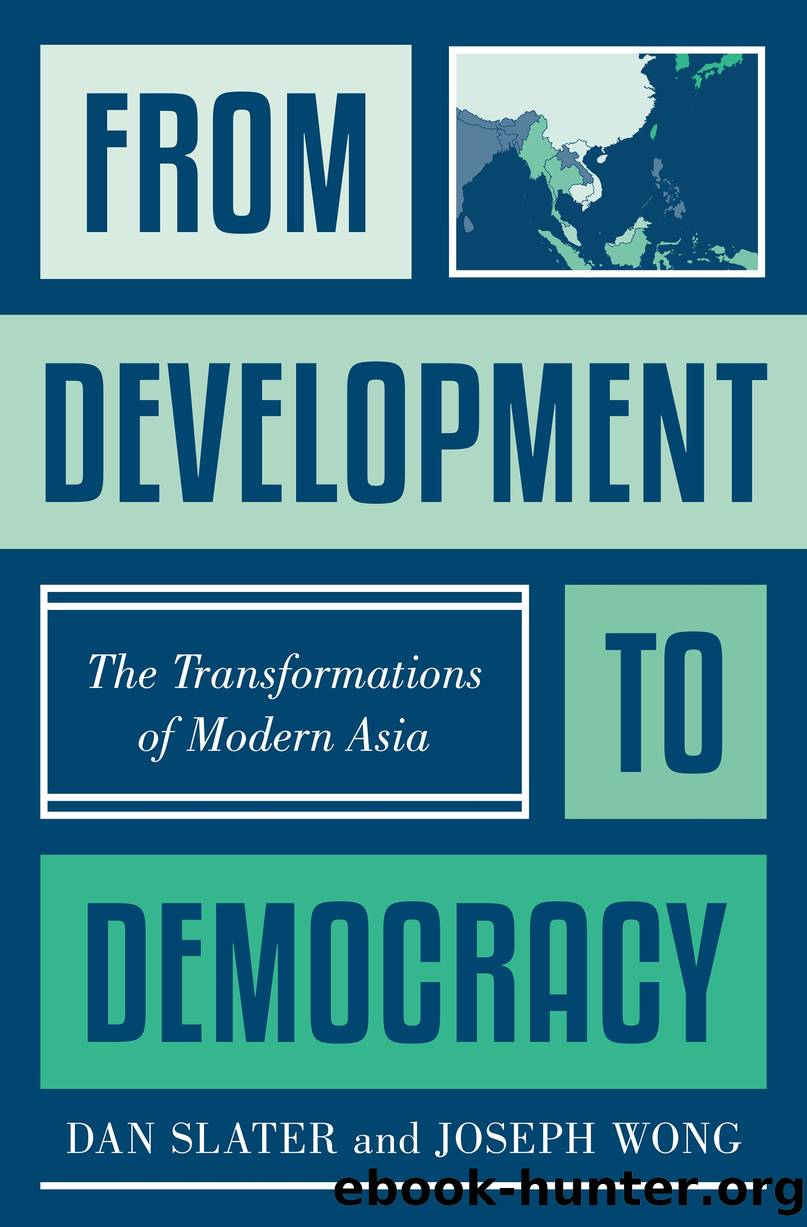From Development to Democracy by Dan Slater

Author:Dan Slater
Language: eng
Format: epub
Publisher: Princeton University Press
Published: 2022-05-18T00:00:00+00:00
The Three Cases to Come
Our case studies begin with Indonesia. Similar to the South Korean case explored in chapter 5, Indonesiaâs authoritarian regime was neither a purely party-dominated nor military-dominated autocracy. Suhartoâs New Order dictatorship (1966â98) was born in one of the most violent counterrevolutionary outbursts of the Cold War era, with hundreds of thousands of suspected communists perishing at the hands of the Suharto-led military and its conservative (largely but not exclusively Islamist) allies.5 Opening the country up to Western and Japanese investment, Suharto ushered Indonesia into developmental Asia and oversaw three decades of spectacular economic growth as well as impressive poverty reduction and substantial urbanization. No feature of Indonesiaâs political economy under Suharto was more striking than its grand corruption, however.
Politically speaking, Suharto installed a tightly managed electoral authoritarian regime. A new authoritarian party, Golkar, was built with military and bureaucratic backing to âsuccessâ multiparty authoritarian elections every five years. When the corruption-ridden Indonesian economy was devastated in 1997â98 by the Asian financial crisis, Suharto exited power as a profoundly weakened leader. But it would only be in the following year that his successor, B. J. Habibie, would dismantle the New Orderâs many authoritarian controls and move Indonesia swiftly to free and fair democratic elections in 1999. The relative smoothness of this democratization process and the cohesive support for it among party and military elites as it progressed can only be understood against the backdrop of authoritarian and conservative strengthsâand thus confidenceâaccumulated over more than three decades of Suhartoâs rule.
This was neither the first time nor the last time that a developmental militarist regime in Southeast Asia would concede democracy through strength. After devoting the bulk of this chapter to detailing the Indonesian trajectory from development to democracy, we turn to the militarist cases that preceded (Thailand) and followed in Indonesiaâs footsteps (Myanmar).
From the late 1970s through the late 1980s, Thailandâs long-dominant authoritarian eliteâits monarchy, military, and bureaucracyâgradually moved the kingdom to civilian rule under fully democratic conditions. This followed a tumultuous democratic experiment from 1973 to 1976, during which the collapse of a corrupt military triumvirate led to three years of intense ideological polarization, culminating in a brutal crackdown on leftist elements in the nationâs capital of Bangkok.6 As in South Korea in the early 1960s, democracy through weakness in Thailand in the mid-1970s proved destabilizing and was quickly, brutally reversed.
What followed was not a return to full-blown authoritarian rule, however, but a gradual process of democratization through strength in which the military and its technocratic allies introduced elections and devised a new constitution and electoral system. The new rules of the game ensured that party politicians could not concentrate enough power to reign supreme over the military and, especially, the monarchy of King Bhumipol. This gradually democratizing system survived a military coup and power grab in 1991â92 and remained steady until the Asian financial crisis of 1997â98 devastated the Thai economy. In response to the crash, democratic politicians wrote a new constitution that concentrated more power in the prime minister and encouraged a consolidation of the perennially fragmented party system.
Download
This site does not store any files on its server. We only index and link to content provided by other sites. Please contact the content providers to delete copyright contents if any and email us, we'll remove relevant links or contents immediately.
| Comparative | Conflict of Laws |
| Customary | Gender & the Law |
| Judicial System | Jurisprudence |
| Natural Law | Non-US Legal Systems |
| Science & Technology |
American Kingpin by Nick Bilton(3866)
Future Crimes by Marc Goodman(3587)
The Meaning of the Library by unknow(2558)
Inside the Middle East by Avi Melamed(2347)
Why Nations Fail: The Origins of Power, Prosperity, and Poverty by Daron Acemoglu & James Robinson(2276)
On Tyranny by Timothy Snyder(2227)
Living Silence in Burma by Christina Fink(2058)
Putin's Labyrinth(2012)
The Mastermind by Evan Ratliff(1930)
The Smartest Kids in the World by Amanda Ripley(1840)
Think Like a Rocket Scientist by Ozan Varol(1809)
Law: A Very Short Introduction by Raymond Wacks(1728)
It's Our Turn to Eat by Michela Wrong(1716)
The Rule of Law by Bingham Tom(1679)
Philosophy of law a very short introduction by Raymond Wacks(1653)
Leadership by Doris Kearns Goodwin(1631)
A Dirty War by Anna Politkovskaya(1611)
Information and Communications Security by Jianying Zhou & Xiapu Luo & Qingni Shen & Zhen Xu(1610)
Civil Procedure (Aspen Casebooks) by Stephen C. Yeazell(1539)
